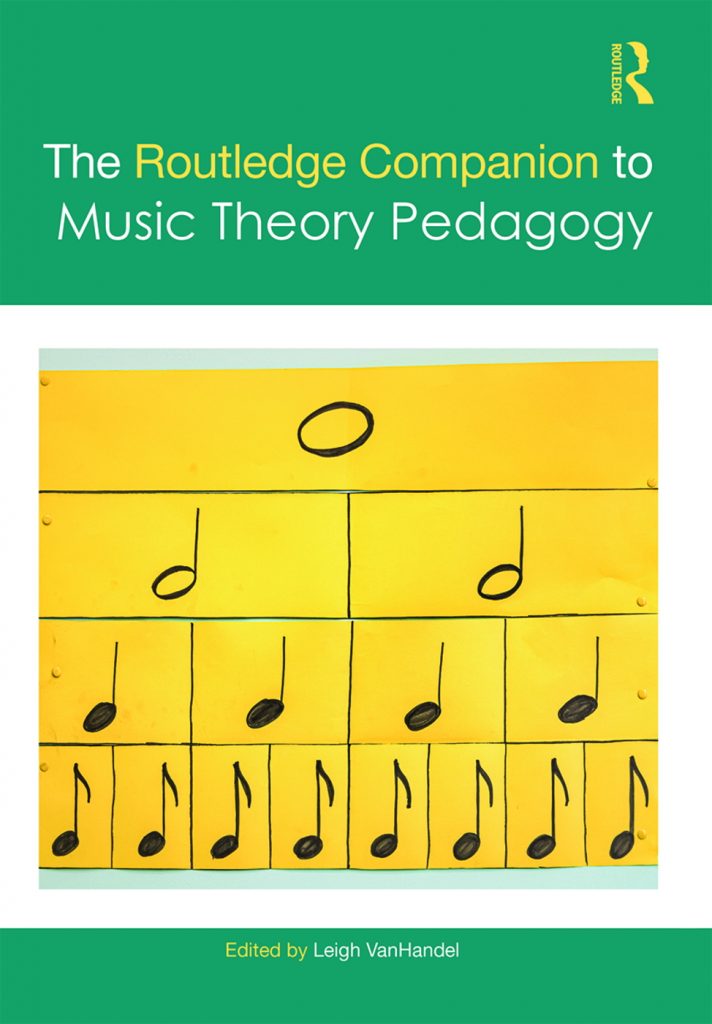Selected Publications
The Routledge Companion To Music Theory Pedagogy
Edited by Leigh VanHandel
February 2020 — Routledge Press

The Routledge Companion to Music Theory Pedagogy provides battle-tested lesson plans alongside discussions of music theory curriculum and course design.
Featuring creative approaches to teaching music theory, the volume encourages active student participation and reflects the diversity of the modern music theory student.
The Supplemental Materials website contains resources for instructors to be able to immediately implement lesson plans.
I is for Imposter
Leigh VanHandel
Talk given at SMT’s Informatics Interest Group Meeting, Society for Music Theory, Columbus OH, 2019
I’ve made it somewhat of a mission to talk about imposter syndrome in academia. I’ve found that acknowledging its existence and shining a light on its effects can help people — especially graduate students — understand some of the things they experience during their career.
The talk was live-streamed and recorded. Unfortunately the beginning of the talk was cut off, but the rest of it is available at the very beginning of this long compilation of SMT talks.
The war of the Romantics: an alternate hypothesis using nPVI for the quantitative anthropology of music
Leigh VanHandel
Empirical Musicology Review, Vol. 11 No. 2 (2016)
This article offers an alternate interpretation for the data described in Joseph Daniele’s 2016 article “A tool for the quantitative anthropology of music: Use of the nPVI equation to analyze rhythmic variability within long-term historical patterns in music.” I examine Daniele’s argument that there is an overall rising trend in rhythmic variability in German composition from 1600-1950, and offer an alternate, historically informed explanation based on the re-examination of the data. The rising trend does not appear to be consistent throughout time, and rather than being the result of the waning influence of Italian music on German music, I suggest an alternative hypothesis concerning documented differences between late 19th century German composers and their compositional styles.
Music Theory Skill Builder
Leigh VanHandel
Oxford University Press, 2013-2020

As of December 2020, Music Theory Skill Builder is no longer being supported by Oxford University Press. Music Theory Skill Builder was an online music theory fundamentals environment that allowed instructors to customize practice drills and assessments to their students and course. Licensed and published by Oxford University Press.
What can music theory pedagogy learn from mathematics pedagogy?
Leigh VanHandel
Journal of Music Theory Pedagogy, Vol 26 (2012)
The pedagogy of mathematics education is an immense field that has enjoyed much more research attention and funding than music theory pedagogy. Current trends in mathematics pedagogy include incorporating elements of cognitive science and neuroscience in an effort to connect mind, brain, and education. If mathematics and music theory are related, as recent research and intuition tells us, teachers of music theory may be able to apply findings in mathematics pedagogy to our own discipline. This article discusses connections between mathematics and music theory, and suggests some starting places for considering best practices in music theory pedagogy.
The role of meter in compositional style in 19th century French and German art song
Leigh VanHandel* and T. Song†
Journal of New Music Research, 39(1), 2010
*lead author
†statistics consultant
This study extends prior research on the influence of linguistic rhythm on musical rhythm to 19th century French and German art songs. Results indicate that the measurement of rhythmic variability used in prior studies, the nPVI, or normalized Pairwise Variability Index, may be of use in studying individual compositional style even when a significant correlation with spoken language characteristics is not present in the repertoire. By modifying and focusing the results of the nPVI, and studying the relationship between rhythmic variability and notated meter, it is possible to determine musically meaningful information about individual composer’s rhythmic characteristics.
National metrical types in nineteeth century art song
Leigh VanHandel
Empirical Musicology Review, 4(4), 2009
William Rothstein’s article “National metrical types in music of the eighteenth and early nineteenth centuries” (2008) proposes a distinction between the metrical habits of 18th and early 19th century German music and those of Italian and French music of that period. Based on theoretical treatises and compositional practice, he outlines these national metrical types and discusses the characteristics of each type. This paper presents the results of a study designed to determine whether, and to what degree, Rothstein’s characterizations of national metrical types are present in 19th century French and German art song. Studying metrical habits in this genre may provide a lens into changing metrical conceptions of 19th century theorists and composers, as well as to the metrical habits and compositional style of individual 19th century French and German art song composers.